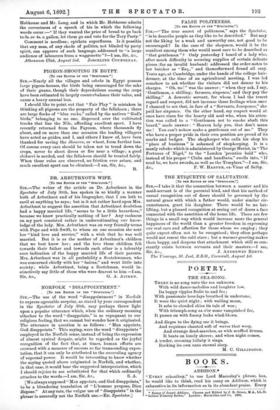FALSE POLITENESS.
[To TR. EDITOR OF TN. " SPECTATOR."] SIR,—" The true secret of politeness," says the Spectator, "is to describe people as they like to be described." But may not the liking be a weak and unworthy one, not good to be encouraged ? In the case of the shopmen, would it be the manliest among them who would most care to be described as "that gentleman" ? Only yesterday I heard of a lady who, after much difficulty in securing supplies of certain delicate pieces (for an invalid husband) addressed the order-notes to her butcher as "Esq.," and thenceforward found all easy. Years ago, at Cambridge, under the hands of the college hair- dresser, at the time of an agricultural meeting, I was led somehow to ask whether the visitors did not demur to his charges. "Oh, no!" was the answer ; "when they ask, I say,
Gentlemen, a shilling; farmers, sixpence,' and they pay the shilling." A domestic servant, for whom I had the truest regard and respect, did not increase those feelings when once I chanced to see that, in face of a "Servants, fourpence," she paid her sixpence. On the other hand, my respect would, at once have risen for the hearty old soul who, when his atten- tion was called to a "Gentlemen not to smoke abaft this board," made answer : "Heaven help you, that don't mean me ! You can't nohow make a gentleman out of me." They who have a proper pride in their own position are proud of its marks and badges. The shopkeeper who calls his shop his "place of business" is ashamed of shopkeeping. It is a manly rebuke which is administered by George Heriot, in "The Fortunes of Nigel," to the "London 'prentice bold" who, instead of his proper " Clubs and handbats," swells into, "If need be, we have swords, as well as the Templars."—I am, Sir,
F. W. HARPER, ex-Vicar of Selby.


































 Previous page
Previous page